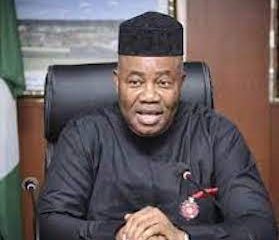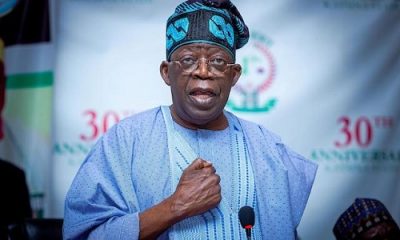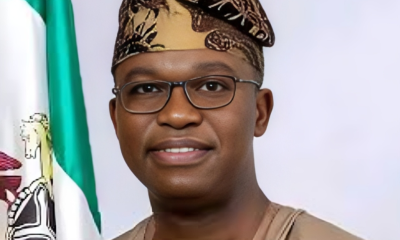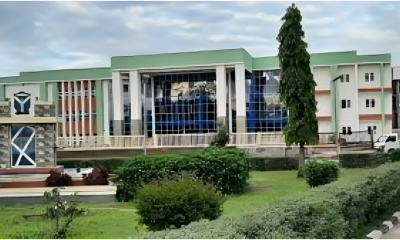NEWS
Nigeria: The Making of a Judicial Selectorate
By Chidi Anselm Odinkalu
Anambra North senatorial constituency comprises seven Local Government Areas (LGAs). These are: Anambra East, Anambra West, Anyamelum, Ogbaru, Onitsha North, Onitsha South, and Oyi. The contest to represent it in the election to the Senate in 2007 turned out to be memorable for all the wrong reasons.
Voting in the election occurred on 28 April 2007. At the end of the contest, the Independent National Electoral Commission (INEC), returned Joy Emordi, the incumbent senator and candidate of the ruling Peoples’ Democratic Party (PDP), as the winner. In the race for the party ticket which preceded the election, Senator Emordi beat out the challenge of a little-known member of the House of Representatives, Ubanese Alphonsus Igbeke. Having lost the contest for the party ticket, however, Ubanese promptly defected to the opposition All Nigeria Peoples Party (ANPP), which granted him the ticket to fly its flag in the contest for the election to the senate in Anambra North.Following the announcement of the election results by the INEC, five of the losing candidates headed to the election petition tribunal to challenge the announcement of Senator Emordi as winner. They included Jessie Balonwu of the Labour Party, and Ubanese of the ANPP. An essential complaint was that there was no lawful voting in Anyamelum and Onitsha South LGAs. If their complaint was upheld, the logic would have necessitated a re-run.Over one year after the conclusion of the election, on 14 June 2008, the tribunal dismissed the petitions, and affirmed Joy Emordi as duly elected. The losing candidates appealed.Jessie Balonwu’s appeal was the first to be decided. On 10 February 2009, a Court of Appeal panel comprising three Justices of Appeal – Victor Omage, Ladan Tsamiya and Olukayode Ariwoola – found that there was no evidence in support of the claim that there were no elections in the two LGAs. The Court of Appeal, therefore, affirmed the decision of the Election Petition tribunal. At the time, appeals concerning elections to the senate ended in the Court of Appeal.Like the other losing candidates, Ubanese lost his case at the election petition tribunal. Like them, he also appealed. Nearly three years after the election, on 24 March 2010, another panel of the Court of Appeal, this time comprising Amiru Sanusi (who was not on the earlier panel) as well as Ladam Tsamiya and Olukayode Ariwoola – both of whom had decided Jessie Balonwu’s case nearly a year earlier – nullified the election of Joy Emordi, declared Ubanese the winner of the election and ordered INEC to issue a certificate in his favour affirming his victory.Six years after that judgment, the National Judicial Council (NJC), sacked Ladan Tsamiya as a judge in connection with judicial corruption in another election case from neighbouring Abia State.Returning to the Anambra North senatorial contest from 2007, Senator Emordi applied to the Supreme Court for a review of the two ostensibly conflicting decisions of the Court of Appeal but the court struck out her case, holding that it did not have jurisdiction to hear her. With one year left to run on the tenure and armed with the judgment of the Court of Appeal, Ubanese ousted Joy Emordi from the Senate in May 2010 to become the Senator for Anambra North. Once there, he promptly defected back to the ruling PDP from the ranks of the ANPP.That was not the first time that Ubanese would be returned as legislator by the votes of judges alone. His first tour of duty as a legislator in the House of Representatives in 2003 was made possible also by highly priced judicial votes.He was not the only one to be selected in this manner in 2003. In the contest for the Anambra South seat for the Senate, the Court of Appeal in Enugu manufactured victory for Ugochukwu Uba – who was not a candidate in the election – after two of the three Justices of Appeal collected humongous bribes to rule in his favour against the candidate who was actually elected. Ugochukwu Uba’s younger brother, Andy, was a very influential presidential confidante at the time.2010 was not the last time that Ubanese’s entire electorate would comprise exclusively of members of the Nigerian judiciary. ThisDay newspaper famously described him as “the serial senator who never wins an election.”In 2011, another high court in Abuja also issued an order requiring the INEC to return Ubanese yet again as Senator for Anambra North after the election had been concluded and a winner declared. The order was stupefying because only an election petition tribunal could issue it.This time, the Attorney-General of the Federation had Ubanese arraigned before the Federal High Court in Abuja on charges of forging and altering the outcome of the party primaries that he lost, misrepresenting to the High Court in Abuja that he had in fact emerged as the winner.Ubanese was ultimately unsuccessful in returning to the Senate in 2011 but had pioneered an electoral business model that would prove both lucrative for all involved and resilient beyond his wildest imagining.Ubanese showed judges how a joint enterprise with politicians could prove effective in making both sides influential, wealthy and powerful while at the same time sidelining the voters from the constitutive enterprise of deciding who controls their destinies. This guarantees that elections no longer end in the polling units. Instead, what we call elections only pare down the candidates who are required thereafter to proceed to court units, where the ultimate selection is determined by judges who alone have the right to vote. The cost of entry into this stage is prohibitive. Only the truly moneyed dare to show up.The constitution may have anointed the people as the electorate but, in Nigeria, the winners and losers in elections are now decided by a judicial selectorate who do not feel themselves beholden to anything that the constitutional electorate may wish, seek, or say.According to a former national vice-chairman of the ruling All Progressives Congress (APC), Salihu Lukman, “citizens can vote but winners are decided in the courtroom by conclaves of judges.” Former president, Goodluck Jonathan, acknowledged in Asaba, capital of Delta State in June 2024 that Nigerian judges increasingly “declare who doesn’t win the election that they are winners.”Selectorate Theory explains how elites access and retain power. It distinguishes between three categories of actors for this purpose. Interchangeables notionally have a role but hardly fit the part. Influentials sometimes may do so. But the focus is on a small category of “Essentials” who decide nearly everything. The clever power seeker focuses on doing a deal with the Essentials at the expense of the Influentials and the Interchangeables.In Nigeria, the judges have made themselves the indispensable Essentials in winning power and retaining it. The people have become very expendable Interchangeables. The national exchequer, meant for the people, now goes to financing the fancies of these electoral Essentials in order to protect the joint enterprise with the politicians. This is all done under ruse of law which, it is claimed, is indispensable to democracy.The “ownership” of judicial figures has thus become an essential political accessory in Nigeria. Every ambitious politician knows that they need to own some judges or at least one. This political business model is a deeply Nigerian variant on Selectorate Theory which is now taking firm root across Africa. For this export, we must thank Ubanese Igbeke and the Uba brothers of Uga in Anambra State. This week, publishers Narrative Landscape will be releasing, The Selectorate, my book which tells the story of how Nigerian judges toppled the people. It is a story that has been long in the making.Chidi Anselm Odinkalu, a lawyer, teaches at the Fletcher School of Law and Diplomacy and can be reached through chidi.odinkalu@tufts.edu.NEWS
Troops Neutralise Notorious Terrorist Auta, others in Zamfara

Troops of Mobile Strike Team, under Operation Fasan Yamma (OPFY), say they have killed scores of terrorists in a decisive operation around Ƙunchin Kalgo in Tsafe Local Government of Zamfara.The Director, Defence Media Operations, Maj.-Gen. Markus Kangye, made this known on Thursday in Abuja.
Kangye said that a notorious terrorist, known as Auta, alongside his associates Abdul Jamilu and one Salisu, were among those killed in the encounter. According to him, these terrorists were linked to multiple acts of violence and terrorism within the general area.“The operation marks a significant blow to criminal elements, destabilizing peace and security in the area.“Preliminary intelligence indicates that two additional terrorist kingpins, including one identified as Babayé were eliminated during the operation.“In a separate incident, Sale Ado Madele (alias Sarki), the eldest son of known bandit leader Ado Alieru, was also reportedly killed,” he said.Kangye said the troops had in another encounter, killed additional 10 terrorists who congregated near a filling station in Danjibga.He said the terrorist were believed to be part of a syndicate brought together by Dogo Sule for a planned attack.“The Nigerian Armed Forces remain committed to safeguarding lives and restoring lasting peace across Zamfara and the wider North-West region.“This operation underscores our resolve to dismantle terrorist networks and bring perpetrators of violence to justice,” he said. (NAN)NEWS
10th Senate Passed 96 Bills, Adopted 18 Petitions-Akpabio
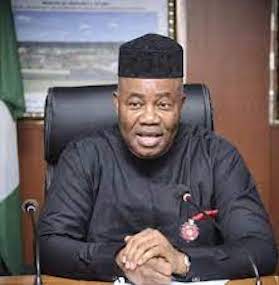
The President of the Senate, Godswill Akpabio, says the 10th Senate has passed 96 bills out a total of 844 bills introduced within its first two years.He said that the Senate also adopted 18 petitions out of the 80 received.Akpabio made this known on Thursday during a joint session of the National Assembly to celebrate 2025 Democracy Day.
He said that the 10th National Assembly had played its part with diligence and distinction. “From its inception, the 10th Senate demonstrated a renewed vigour for addressing the country’s complex challenges through purposeful legislation.“This commitment is reflected in its extraordinary output: a total of 844 bills have been introduced within its first two years—an unprecedented figure.“This figure underscores the Senate’s proactive posture in tackling pressing national issues.“Out of this impressive volume, 107 bills are currently at the committee stage, undergoing the necessary scrutiny and stakeholder engagement that ensures quality legislation.“Two hundred and six bills are awaiting first reading, reflecting a robust pipeline of legislative ideas prepared for formal introduction and 409 bills have advanced to second reading.“Notably, the Senate has passed 96 bills, a record for any Nigerian Senate at this stage of the legislative cycle.“Even more significantly, 52 of these bills have been assented to by the President, translating into enforceable laws that will shape governance, economic development, public welfare, and national security.“These bills include the National Education Fund, Local Government Autonomy Bill, Regional Development Commission, Tax Reform, University and Tertiary Institutions, Agricultural Institutions bills etc.”Akpabio said that the upper chamber had acted decisively on 26 Executive bills, showcasing a healthy balance of cooperation and oversight in its engagement with the executive arm.“These executive-sponsored legislations address key policy areas and benefit from the Senate’s thorough review and refinement before passage.”The senate president said that beyond bills, the 10th Senate had received a total of 80 petitions from citizens and civil society.“This is a testimony to public trust in the institution. Of these, 18 petitions have been fully adopted, providing redress, transparency and institutional accountability,” he said. (NAN)NEWS
JUNE 12: Good Governance is the Cornerstone of Democracy – CAN

By Laide Akinboade, Abuja
President, Christian Association of Nigeria (CAN), Archbishop Daniel Okoh on Thursday, facilitate with all Nigerians as they commemorate June 12, a day that symbolizes the collective commitment to democracy, freedom, and justice. He added that the legacy of the 1993 elections remains a beacon of hope and a reminder of the nation’s enduring democratic spirit.
This was contained in a statement issued by CAN, signed the CAN President, in Abuja. .The Archbishop lamented the rate of kidnappings and killings by bandits urged the Federal government take an urgent and sustained action to safeguard lives and property across the country.The statement reads in oarts, “As we reflect on this journey, we urge all Nigerians to embrace unity, peace, and mutual respect. We must stand firm against religious intolerance and violence in all forms. The government has a sacred duty to protect religious freedoms, ensure that no one is persecuted for their faith, and deliver justice to victims of religious violence.”Insecurity, including insurgency, banditry, and kidnapping, continues to threaten our nation’s stability. We call for urgent and sustained action to safeguard lives and property across the country. CAN remains committed to supporting every initiative aimed at restoring lasting peace and security.”Good governance is the cornerstone of any democracy. We call for greater transparency and accountability at all levels of government. Nigeria’s vast resources must be harnessed to address poverty, unemployment, and inequality, and to improve infrastructure, healthcare, and education. Free, fair, and credible elections are vital to sustaining democratic integrity.”We urge the Independent National Electoral Commission (INEC) to strengthen its systems and processes to enhance electoral transparency and public trust. In a true democracy, the rights to free speech, peaceful assembly, and press freedom must be upheld. We encourage the government to engage citizens constructively and seek inclusive solutions to national challenges.”As we mark this significant day, CAN prays for the peace, unity, and progress of our beloved country. We call on all Nigerians to remain committed to building a just, inclusive, and prosperous nation; one that honors the sacrifices of our democratic heroes.”We also appreciate the efforts of the government, security agencies, and citizens who continue to uphold the values of democracy and national cohesion.”God bless the Federal Republic of Nigeria”, he said.
